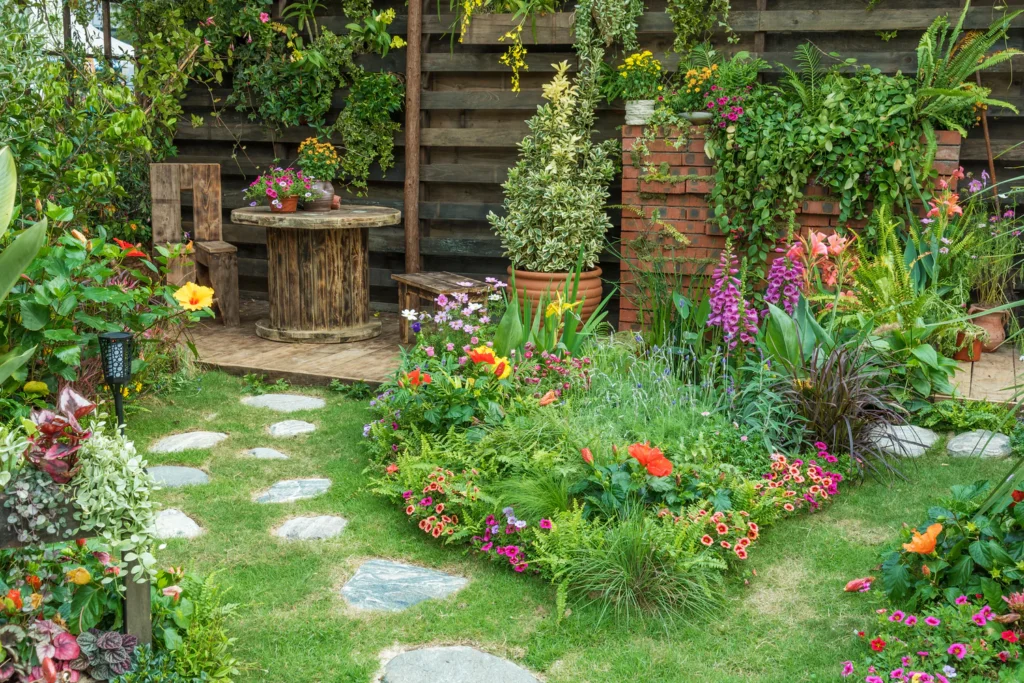In today’s world where environmental challenges are increasing, gardening is not just a hobby but also a means to make the earth greener and healthier . If you want to make your garden more sustainable and eco-friendly, then small changes are enough for this.
Be it saving water, using organic fertilisers, or giving preference to local plants – all these steps together will not only make your garden beautiful but will also prove beneficial for nature.
In this article, we will tell you 10 easy and effective ways to make your garden more sustainable and eco-friendly .

Trees are brilliant at drawing down carbon from the atmosphere.
If all 30 million UK gardeners planted a medium-sized tree in their community, school, workplace or garden and nurtured it to maturity, they would store enough carbon equivalent to drive you more than 11 million times around our planet.
Switch from mains to rains in your garden to save carbon.
Use a water butt containing water that falls onto your roof instead of turning on a tap from the mains supply, or use a watering can instead of a hosepipe. So far 6.6 million litres of water have been pledged to save on the RHS mains2rains website, equivalent to taking 82,385 baths – saving enough carbon equivalent to charge 1.3 million smartphones.


Peatlands are the world’s largest carbon store on land. They provide valuable ecosystems for plants and animals and act like sponges, reducing the risk of flooding.
When we take peat for our gardens, carbon is released and habitats are damaged. Keeping peat in bogs – not bags – is a crucial part of the fight against climate change. Our planet’s billions of acres of peat hold more carbon than all the world’s forests combined.
Carbon saving quantities linked to home composting (as opposed to buying bagged retail compost) are equivalent to 1.85 miles (driven by average car) saved per kg of home compost made.
Every 1kg of homemade compost typically saves over 0.1kg fossil CO2 emissions, which could save more than 5.1 kg carbon, per gardener, every year.


Garden soils and perennial plantings play an important role in storing carbon.
If 30 million gardeners pulled up a paver and planted 1m² of perennial plants (either herbaceous, shrubs or trees) in their community, school, workplace or garden and allowed it to develop to maturity, depending on the plants grown this would be equivalent to heating between 86,000 to more than one million homes for a year!
Pollinators need our help. Loss of habitat is one of the main reasons why we see fewer bees, butterflies and other insects visiting our gardens.
Help slow and reverse the declines in bees, butterflies, moths, hoverflies and other pollinators by growing a wide variety of plants including a mixture of native, near-native and exotic plants to support pollinator diversity.


Some imported flowers have up to 10 x the carbon footprint of home or UK-grown bouquets.
Growing or buying UK-grown cut flowers can save up to 7.9kg carbon per bunch compared with buying some imported bunches.
An average petrol power tool emits 0.848 kg carbon per litre of petrol used. It’s not only carbon, they emit harmful particulate and noise pollution too.
If the 21% of UK gardeners who use power tools switched from fossil fuel to green energy electric-powered tools, it would save enough carbon equivalent to drive around the planet 29,820 times.


Help map UK garden plant diversity
Add your garden plants to RHS My Garden online. Together we can help map UK garden plants, helping to conserve and grow this important biodiversity now and for future generations. So far we have 122,000 users who have added 2.4 million plants consisting of 77,600 different types of cultivated plants.
Buying locally sourced and home-grown produce can save significant amounts of greenhouse gas emissions.
save significant amounts of greenhouse gas emissions.
Eat more home-grown UK, local and seasonal fruit and vegetables from local sources or from your own garden or allotment. Growing at home allows you to choose not to use pesticides – another plus for the planet.

Sustainable gardening is a great way to protect the environment and make the most of natural resources. Small changes like saving water, using organic fertilizers, planting local and seasonal plants, composting, and reducing plastic use—all of these not only make your garden beautiful but also beneficial for nature. With these 10 easy ways, you can make your garden not only greener but also more eco-friendly.
#SustainableGardening #EcoFriendly #GreenLiving #OrganicGardening #Carrerbook#Anslation#ClimateAction #GoGreen #NatureLovers #EcoGarden #SustainableLiving #GardeningTips

